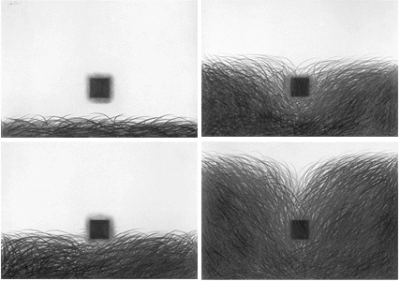
An Account of the Saltscape,
in Three Parts
1.
We were in the field together, ours, lying loving, then arguing to stand. And suddenly she turned from me, was turned from me, away, and turned to salt. As that, in salt, she was no less beautiful, though certainly less mine if ever she had been.
I stood a dark facing her pale, taking it, her, in. Immaculate small fineness, grain packed deep and tight in the form which fit my arms, which was fit to my arms, as if my reach was her and her only, as she was, once, so perfect, now hardened. I circled her then—observing her hard in all the curves she hated to be observed in—circled her seven times, circled around and around, observed her head to toe and observed her cleavages, the whiteness thick and yet still white as nude. I, circled. Circled her screaming, screamed everynot I ever needed, screamed long pinch on love, asking, why me? Asking the asked to her full pureness, reaffirm to undeny, screaming myself to stasis. Sweep of jaw, column of neck, fluted, shoulder to arm, grains, sun-holding wrist and hand upheld, about to slap. Me, my living face… and, suddenly, she turned from me, was turned from me, away, and turned to salt.
I was bitter, and so I broke off a finger, brittle, her right hand’s index at the cracking to crackling knuckle, loosing grains. I held the finger, her finger, aloft. To touch the sky. An idol. Pointing fault. To print my nipple in. I popped it in my mouth. And thought, couldn’t help but think, salty. I sucked, and sucked its nail, sucked its length pursing down to its first joint, the second as my lips puckered, withdrew into my face itself, paled me, sucked me in—I internalized what must have been her sin—to clearness, clarity, unto near transparence (of all my possible motives) … a disappearance into white myself, my own: I dissolved into a cloud. Of the wide high summer’s day.
Gaining heavens, floating, light, up above her, hovering there, still. Gathering my tears to heavy, a womb of my own, finally, above her imperfected form, then—after how many lights and darks, windlessness, I do not know—I loosed hot rain, fell down on her, drizzle to dump to melt her, and myself suspended, ruining her features, a deep smudge, unmelting candle unlit forever, a running dissolution to the lying standing field. Ours. Where. I wisped away, high, my own dispersal, a fade to goneness, to edge of glare off wildflowers, growing wild of her, grown and white.
The child, the boy they never had, never made together as two, as one he merges from the wideless horizon, sensibly dressed for the weather, skips, with thought, through the field, theirs, gathering, picking flowers at their highest, fullest spread from the roots. He skips, with thought, straight to their house—the home they never made together, strewn, horizoning all around the field, theirs—to place the flowers, white and wild, in a large, round glass vase that her mother, that his mother’s mother, never to be, had disinherited them on the immense to endless table his father had never found room to nail for. And sand. Then the child, the boy, theirs, pulls up a chair, and sits, head in hands, alive with weight, staring, senseless, at his weak reflection in the vase, large, its rounded distorting glass until the flowers, wild as white, wilt themselves to finest hair which, soon, overflows his second, lesser face, whelms his eyes, until both sleep.
2.
I had never practiced never done it before I stood in the field I am to be found standing in staring just staring at an airplane as high as the sky and skyer. I stared at it stared at it followed it thorough until it seemed to fall through space. Indeed it fell through space white falling smaller and smaller as if to land in my palm but I did not catch it when it hit to earth as salt. An airplane of salt small splitting into four smaller directional pieces upon impact two split wings the central length of passengers maybe cargo broken into two pieces too four pieces for four rooks. Rooks being black birds of outsize size can be mistaken for crows if you’re not familiar. Four rooks beaked up the broken pieces of plane one piece to each they each flew to the four corners of the cornered field one to each and one to each and on. But being salt the rooks could not would not eat the pieces dropping them instead back to the ground each to each quarter of each rook and flew in frenetic orbits each around its own piece guarding what won’t fly and what they won’t eat from what only they are known to know.



The Jerusalem Same-Sex Attraction Group
Phil S. Stein
The Second Coming of Yeshayahu Leibowitz
Avi Steinberg
An Account of the Saltscape
Joshua Cohen
Fresh Baked Bread
Jay Michaelson
Out of the Depths
Lorna Knowles Blake
Lore
Adam Lavitt
Archive
Our 790 Back Pages
Zeek in Print
Fall 2005 issue out now!
About Zeek
Mailing List
Contact Us
Subscribe
Tech Support
Links
From previous issues:
Empowering Jewish Progressives
Deconstructing Zell Miller
The Hamas Class of 1992
Dara Silverman talks with Leah Koenig
Jay Michaelson
Michael Shurkin